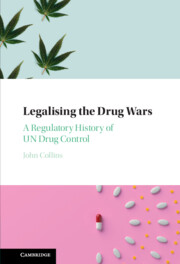Book contents
- Legalising the Drug Wars
- Legalising the Drug Wars
- Copyright page
- Dedication
- Contents
- Acknowledgements
- Abbreviations
- Historical Overview: The International Drug Control System
- Introduction
- 1 Drug Diplomacy from the Opium Wars through the League of Nations, 1839–1939
- 2 International Drug Control in Wartime, 1939–1945
- 3 Creating the UN Commission on Narcotic Drugs, 1945–1946
- 4 Reconstructing Drug Control in Europe, Asia and the Middle East
- 5 Old Battles Anew at the UN Commission on Narcotic Drugs, 1946–1948
- 6 Dividing Up the Global Licit Market, 1948–1953
- 7 From the 1953 Protocol to the 1961 Single Convention
- 8 Assessing the Legal Legacy of the Single Convention
- 9 Conclusion: UN Drug Control in the Twenty-First Century
- Notes
- Bibliography
- Index
7 - From the 1953 Protocol to the 1961 Single Convention
Published online by Cambridge University Press: 25 November 2021
- Legalising the Drug Wars
- Legalising the Drug Wars
- Copyright page
- Dedication
- Contents
- Acknowledgements
- Abbreviations
- Historical Overview: The International Drug Control System
- Introduction
- 1 Drug Diplomacy from the Opium Wars through the League of Nations, 1839–1939
- 2 International Drug Control in Wartime, 1939–1945
- 3 Creating the UN Commission on Narcotic Drugs, 1945–1946
- 4 Reconstructing Drug Control in Europe, Asia and the Middle East
- 5 Old Battles Anew at the UN Commission on Narcotic Drugs, 1946–1948
- 6 Dividing Up the Global Licit Market, 1948–1953
- 7 From the 1953 Protocol to the 1961 Single Convention
- 8 Assessing the Legal Legacy of the Single Convention
- 9 Conclusion: UN Drug Control in the Twenty-First Century
- Notes
- Bibliography
- Index
Summary
This chapter examines the creation of the 1961 UN Single Convention on Narcotic Drugs. It was also a period when transatlantic relations reached a new low in drug diplomacy. Minor cooperation in the aftermath of the 1953 Opium Conference gave way to divisions leading to an eventual rupture over the Single Convention, particularly between Britain and the US. This breakdown was ultimately was the result of failures of US leadership as well as deep divisions over policy and economic interests. The US found itself increasingly alone in negotiations. State Department leadership sought a more conciliatory approach towards producers like Iran and Afghanistan. Nevertheless, with Anslinger increasingly absent and with a lack of institutional knowledge within the State Department US delegations struggled to develop a US grand strategy. Britain, continuing to carve out a role of quiet, consensual and self-interested drug diplomacy, found the new environment conducive and became increasingly assertive. London pragmatically worked with shifting coalitions, while building a moderate bloc of manufacturing states in Europe to help protect British domestic interests via the Single Convention. The result was a consensus-based treaty and one largely rejected by the US, which tried and failed to torpedo the treaty.
Keywords
- Type
- Chapter
- Information
- Legalising the Drug WarsA Regulatory History of UN Drug Control, pp. 159 - 188Publisher: Cambridge University PressPrint publication year: 2021

